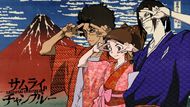Samurai Champloo is one of those series that has cemented its name as a must-watch anime of all time. The story is set in the Edo period, and the animation has stayed true to its artistic style. However, beneath the stylized animation, this anime offers us a philosophical question in the form of two characters. Jin and Mugen are two swordsmen, but besides being good with swords, they have no connection with each other at all.
These characters are the embodiment of chaos and order. At first, it seems like they have no connection at all with each other at all. Jin focuses his energy on maintaining his discipline. From the way he wields his sword to his way of life, everything is deeply rooted in tradition.
Meanwhile, Mugen is a free spirit. He relies on instincts and is heavily impulsive. Moreover, his fighting style is also erratic, and there is no rhyme or system he follows. When it comes to being formal, Mugen has no idea about how to start behaving with manners. He is the true embodiment of freedom.
This is where the masterful story comes in. Samurai Champloo ensures that these characters are not given preference. No one is completely good or bad. These characters are not supposed to reflect any traditional archetypes; we see them as people. The realness the story has maintained is what kept the viewers hooked throughout the series.

In anime, when two characters are active in a duel, it usually has more meaning behind it than just a display of power. These battles can be interpreted as conversations between different ideologies. Basically, when Jin and Mugen drew swords to fight each other, it was never out of hate.
It is an argument about whose lifestyle is better. Jin’s swordsmanship is about control; every moment is precise and thought out. It is like a chess game, and we can see how much hard work and effort he has put in to achieve such finesse.
Mugen's swordsmanship in Samurai Champloo is exactly like his personality. He has been a street fighter who had to defend himself against all odds. That is why his fighting style is unpredictable, and this unique trait of his becomes his greatest strength.
That is why when they have a sparring session, it looks visually intense. While it is entertaining to watch two different people fighting it out to make the other realize that their way of life is better, the fight itself is symbolic.
Neither can gain the upper hand because neither path is inherently superior. In the end, they just end up balancing out each other.
Mugen’s character resonated more with the audience in Samurai Champloo

Out of the two, I believe that it is Mugen's character in Samurai Champloo that ends up being more relatable to the audience. It is because he is flawed as a person. In my opinion, he has been someone who has had no support system to figure life out. Yet when he is put in a situation where he has to fight for his life, he leaves no stone unturned.
Many people aspire to live like Jin, but looking at the current world, it is too much to ask for. Not everyone has access to a guide or a mentor. We end up figuring things out on our own. Mugen in Samurai Champloo is inspiring because, ultimately, he managed to be on equal footing with someone who had trained under a teacher.
It shows us that if we are determined to achieve something in life, there is no single path to it. It reminded me that healing isn’t always quiet or clean. Sometimes it looks like surviving, inch by inch, giving our best whenever we can.
Final thoughts
In the final episodes of Samurai Champloo, Jin and Mugen finally had an opportunity to have one last battle to the death. But they chose not to go through with it. Not because they’re afraid, but because they’ve outgrown the need.
The journey changed them. And perhaps, in our own lives, the question isn’t whether we’re more like Jin or Mugen. The question is whether we’re willing to let the other part in. Whether we can learn to stand still when it matters and move unpredictably when it counts.
